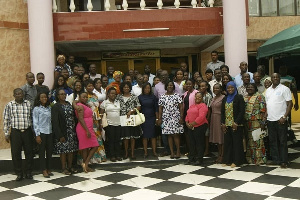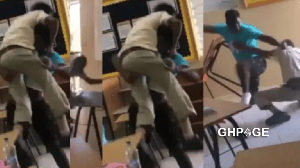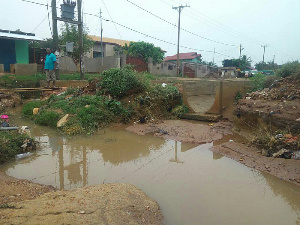Children in Accra no longer visiting drinking bars following UNICEF intervention

An intervention by the UNICEF in some selected districts in the Greater Accra region, under the Child and Welfare Policy of Ghana and the National Gender Policy has helped in reducing the growing menace of some under-aged children patronizing services of drinking bars.
Making this known during a week-long training workshop for Regional, Metropolitan, Municipal and District Assemblies (MMDAs) on Adolescent Sexual and Reproductive Health at Dodowa, the District Chief Executive for Shai Osudoku, Daniel Akuffo explained that the situation calls for stronger collaborations and partnerships in curbing the situation.
The Child and Family Welfare Policy of Ghana and the National Gender Policy have a key focus on the prevention of violence, abuse and exploitation of children while protecting them from all forms of harm.
The overall goal of the Policy is to help formulate child and family welfare programs and activities to more effectively prevent and protect children from all forms of violence, abuse, neglect and exploitation.
“The intervention is timely since my District is rapidly urbanizing with people from Accra finding this place as the choice destination, and we all know urbanization comes with its own challenges,” Mr. Akuffo said.
He also stressed the heightened levels of awareness of child protection issues that communities in the district have recently recorded, owing all of them to the input from the new Policy.
Mr. Akuffo, however, called for continuous and dedicated support from organizations and bodies of authority so that they can increase the coverage area from the 33 communities to cover all 200 communities in his district.
Mrs. Vera Allotey, acting Regional Director for the Department of Community Development, Greater Accra, outlined the several activities that have been undertaken towards the implementation of the Child Protection Tool Kit in two hundred and fifty-five (255) communities in the Accra Metro, Weija Gbawe, Ga West, Ga East, La Nkwantanang Madina, and Ga East districts.
“Twenty-three thousand, seven hundred and eleven (23,711) participants have been reached and sensitized through intensive community engagement done from November 2018 to February 2019,” she said.
Among the many discoveries they made, Mrs. Allotey mentioned that challenges such as teenage pregnancy, children watching pornographic materials (in some cases in the presence of adults), gambling through game centers, pre-mature financial independence, physical-emotional-verbal abuse, child neglect, child labour, child co-habitation and the exposure of children to alcohol and illicit drugs were identified.
She added that while the measures they had set in place had not been fully successful in dealing with the issues, a response in the form of new set of tools and additional modules on Adolescence, Sexual and Reproductive Health, Gender and SGBV have been developed and finalized for production.
“It is meant to support non-prescriptive community engagements around issues affecting adolescents in a holistic manner, including aspects of self-confidence and self-esteem, body image, puberty, menstrual hygiene management, girl’s education and adolescent nutrition,” she further explained.
The week-long event ended with participants visiting communities in the Shai Osudoku District to put into practice some of the tools, activities and lessons they had received during the various sessions.
Source: Graphic.com.gh





